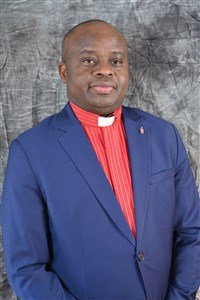2024 Lent Devotional: Week 7
by Bishop Mande Muyombo
During this Lenten season, I would like to reflect on the story of Timothy as accounted in Acts 16:1-5, a narrative that underscores the critical question of diversity which was experienced by the earlier church.
Luke presents Timothy as a disciple, a son of a faithful Jewish mother and a Greek father. While no one knows why Timothy was not circumcised when he was a child, Timothy was not circumcised when he came to Christ and first met Paul. The question of citizenship of Timothy raised a lot of questions.
Without getting into more complex issues, the question of circumcision of Timothy prompted the Council of Jerusalem to emphasize that there was no need for gentiles to undergo circumcision as a precondition of belonging to the early Christian community. In this regard David Scott argues that “while we often think of the early church in idealized terms, it was a church with great deal of cultural diversity, which mapped into geography and theology.” 1
The shift from the Jewish community to the Greek community or the mixture if the two, led to the interactions of the two distinctive cultures. Hence, this elevated Timothy to be a kind of a cross-cultural figure and yet very immersed in Christian mission and ministries.
As the United Methodist Church wrestled with its worldwide nature, its general conference established the Standing Committee on Central Conference matters to bring more relevance to the local while keeping the wider connection stronger. “The General Conference recognized the differences in conditions that exist in various areas of the world and the changes taking place in those areas.” 2
Returning to the early church, the Jerusalem Council opted to create two regions to solve the issue of diversity around the question of circumcision. The pillars of the church, namely, John, Peter and James decided to minister to the church in Jerusalem and its surroundings. Paul and Barnabas were assigned to Antioch and other gentiles city while continuing to collect funds to support the saints or poor in Jerusalem. By doing so, the leaders of Jerusalem and Antioch maximize mission and ministries in both regions while keeping the connection and learning from one and another.
Similarly, the United Methodist Church through the worldwide regionalization has an opportunity to deal the diversity questions around several contextual issues while maximizing mission and ministries in places such as Africa, Europe, the Philippines and America. “United Methodist believers in various regions of the world will not only worship God in their own languages but also bring their own cultural traditions into their practice of United Methodism and use their theological resources to speak to the issues of their own contexts.” 3 I strongly believe that as Jesus Christ entered Jerusalem as a humble King, he was revealing himself to all nations, all cultures, and all races. I am proud of being part of a United Methodism that has been cooked in an African pot and I intend to be part of the United Methodist Church organized in regions.
1 “Regionalization and Connectionism: The Early Church” written by Dr. David Scott, Mission Theologian
for GBGM. Scott’s essay http://www.umglobal.org/2022/10/regionalization-and-connectionalism.html
2 The 2016 Book of Discipline introduces the Standing Committee thus: Section XVI. Standing Committee
on Central Conference Matters ¶ 2201. General Provisions—1
3 David Scott, Opcit.
You make our collective work possible by your witness for justice every day in your church, community, and Annual Conference. MFSA does not receive any financial support from the United Methodist Church's giving channels. 100% of our budget is funded through your membership dues and your generosity in giving.
Bishop Mande Muyombo was elected to the episcopacy in 2017. He is the Resident Bishop of the North Katanga Area, which includes North Katanga, Tanganyika and Tanzania conferences in the Congo Central Conference of The United Methodist Church.
Muyombo was an executive of the General Board of Global Ministries when he was elected on the fourth ballot during the Congo Central Conference in 2017. He is the first graduate of Africa University to be elected bishop and the youngest episcopal leader in the central conference.
Bishop Muyombo holds a Bachelor’s (Department of Theology) and master’s Degree (IPLG) from Africa University as well as master’s Degree in Theology and Doctor of Ministry from Saint Paul School of Theology, Kansas City, USA.
After working as President of Kamina Methodist University, he served as the Executive Secretary for Africa at the General Board of Global Ministries and was subsequently promoted to Assistant General Secretary in the Missions and Evangelism Department.
Bishop Muyombo is married to Blandine Mujinga, an Africa University alumna and they have three daughters and a son.

